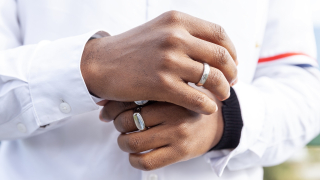If I could describe Blackbird in three words, I would choose “protect your neck.” The movie is a little over 90 minutes long, but has a miniseries’ worth of materials to work though within that miniscule amount of time. The film is an adaptation of the novel by the same name, penned by Larry Duplechan.
There is a kidnapping, an unplanned teenage pregnancy, and subsequently, an abortion. There is the issue of interracial dating, statutory rape, and a suicide attempt. However, of those myriad of issues, the driving force of the story (helmed by director Patrik-Ian Polk) is Randy Rousseau, and his struggles to embrace his homosexuality and his devout Christian faith. If that wasn’t enough, all of this is set in a small town in Mississippi. Because life is not hard enough for these people.
Polk has Rousseau, played by Julian Walker, introduce this conflict in a way that is vulgar as it is hilarious. During a dream sequence, Randy the choir boy is performing and suddenly joined by his crush. There are hints of homoeroticism in their exchange, but the hints turn into screams as Randy’s crush disrobes himself and Randy and the two proceed to make out inside of the church for all of the congregation to see. Ultimately Randy wakes up from his wet dream that we are made abundantly clear is wet by his ejaculation.
It is a common sleep pattern for Randy, and while depicted provocatively, likely resonates with many a Jesus-loving gay boy who knows what it’s like to awaken “soaked in sin”—present company included.
Academy Award-winning actress Mo’Nique portrays Randy’s mother, Claire Rousseau, grief-stricken and haunted by the kidnapping of her daughter. Upon learning of Randy’s sexuality – again, in especially blunt fashion – Claire condemns her son and faults him for his sister’s disappearance. Having your Christian mama fault your biology for some unforeseen circumstance is another aspect of this film that’ll likely resonate with select moviegoers.
While there is surely a lot going on, and arguably, too much in a short amount of time, there are lot of aspects of this movie that make for interesting watching. It’s always hilarious to see closeted gay men deny themselves. Say, Randy quipping defiantly, “I’m not bitchy. I’m in the choir.” Whatever you say, sis. The same goes for Randy trying in vain to be ‘delivert’ from his sexuality by way of his equally virginal friend, Crystal.
Likewise, Blackbird does remind you of what a gifted dramatic actress Mo’Nique is. More often than not, unapproving parents, and in particular, mothers, are portrayed, and thus, judged harshly for not simply falling in line with their children’s homosexuality. Even if wrong in their position, it is often rooted in this notion of a child’s soul being more important than the life they lead on Earth.
Claire is a spiritual woman. Her faith is what keeps her going. To have her child question her faith with his “condition” is a challenge to her. Mo’Nique handles this delicately, giving humanity to a character who could stand to be a little more humane.
And there is Isaiah Washington, who plays Randy’s father and Mo’Nique’s estranged husband, Lance Rousseau. The disappearance of their daughter put a strain in his marriage to Claire, but Lance is still trying to maintain a relationship with his son. It is not easy for him, but there is a moment when Randy turns to his dad because he’s the only one he can turn to.
It’s a special moment between father and son, and after seeing Lucious Lyon behave some heartlessly on Empire, it is nice to see a Black father be perfectly accepting of his Black gay son.
The movie ends on a high note, but whether or not you leave the theatre feeling good will depend on your stamina for so much storytelling. All in all, it’s good to have more explorations of how faith can stifle our sexual and emotional health, and whether or not the Lord truly gives a damn about who we have wet dreams about.
Michael Arceneaux hails from Houston, lives in Harlem, and praises Beyoncé’s name wherever he goes. Follow him @youngsinick.













